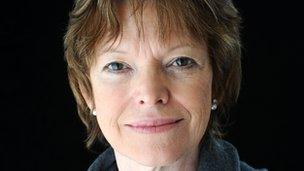Ofqual may step in over speedy GCSE shake-up
- Published

Ms Stacey warns of a challenging timetable
The head of England's exam regulator Ofqual has warned she will delay the education secretary's GCSE changes if there are problems with the timetable.
Michael Gove confirmed on Thursday he was abandoning plans to introduce new O-level-style English Baccalaureate Certificates (EBCs).
But he called for brand new GCSEs in core subjects to be ready in 2015 - the same timeframe as the EBCs.
Ofqual chief Glenys Stacey said the timetable had to be kept under review.
The government's policy U-turn followed intense criticism from teachers and MPs. An education committee report said Mr Gove had been trying to implement "too much too soon".
The original plan had been for the first candidates to start EBC courses in 2015 and take the new-look exams two years later. These would be initially in three core subject areas - English, maths and sciences - with an extension later to history, geography and languages.
In the Commons. Mr Gove said he had asked Ofqual to ensure that there would be new GCSEs in seven subjects - English, maths, the sciences, history and geography - ready for teaching by 2015. These would normally feature exams and assessments at the end of the course, and fewer structured questions.
He also wants GCSEs in all other subjects to be ready for teaching by 2016.
He insists that there is an urgent need for reform of the exams young people sit at age 16 and has previously said GCSEs are not fit for purpose.
Ms Stacey said in her letter to Mr Gove: "The timetable for qualifications development that you have set out is challenging.
"We know you would not want us to compromise on the quality or standards of the qualifications."
She added: "We will need to jointly keep the timetable under review and if problems arise Ofqual would, if necessary, delay the reforms."
'Pace of change'
Ms Stacey said that she would launch, as soon as possible, her own consultation on the exam boards' development of the new qualifications.
And she sounded a note of caution about the extent to which GCSEs in other subjects can be ready
The Mathematical Association also expressed concerns about the speed of the changes.
Its president designate, Peter Ransom, said: "The pace of change in recent years has been relentless and we are still uncomfortable with the proposed timeline for GCSE reform. The proposals are extremely significant and we simply cannot afford for them to be botched or mishandled.
"The 2015 schedule for implementation is so ambitious that no time will be available for piloting, reflection and refinement."
Dr Kevin Stannard, director of innovation and learning at the Girls' Day School Trust, also expressed concerns.
He said the new policy had "succeeded in changing the label on the box", but added that "much of the original content remains".
He added: "There is a danger that some sweeping and damaging 'reforms' will now go through without further discussion, on the mistaken assumption that the DfE has done a U-turn."
The Department for Education said: "We must take swift action to address the loss of rigour in GCSEs and ensure pupils are ready to succeed in the world of work when they leave school.
"We believe our timetable is realistic and will work closely with Ofqual to make sure the reforms are delivered effectively."
- Published7 February 2013
- Published7 February 2013
- Published31 January 2013
- Published7 February 2013